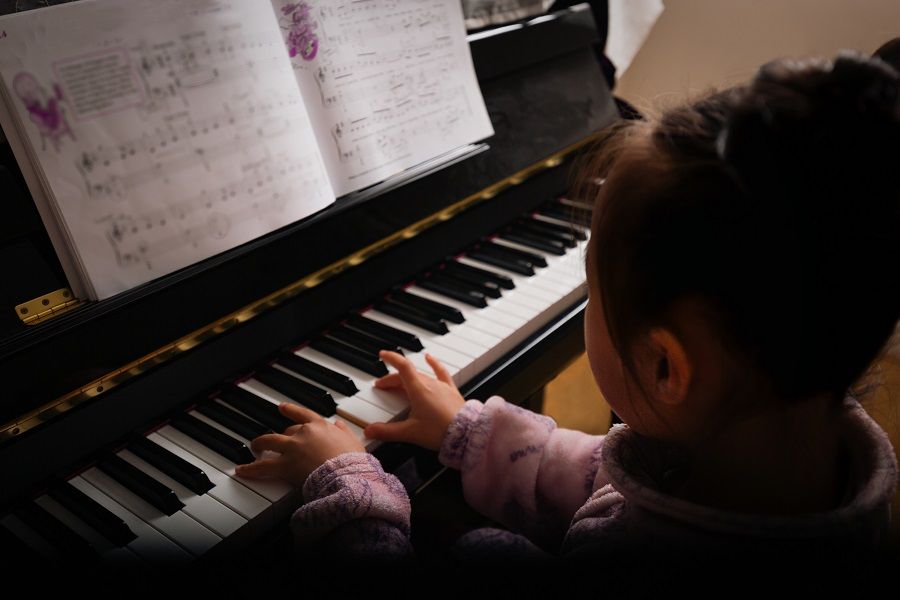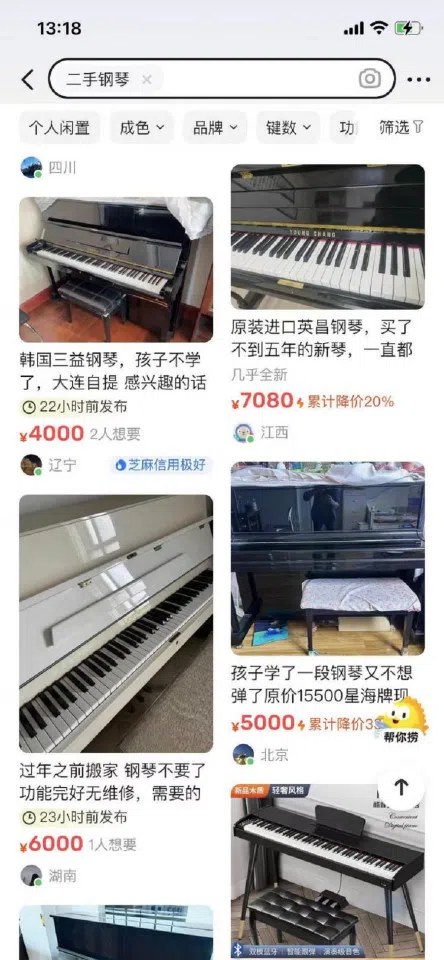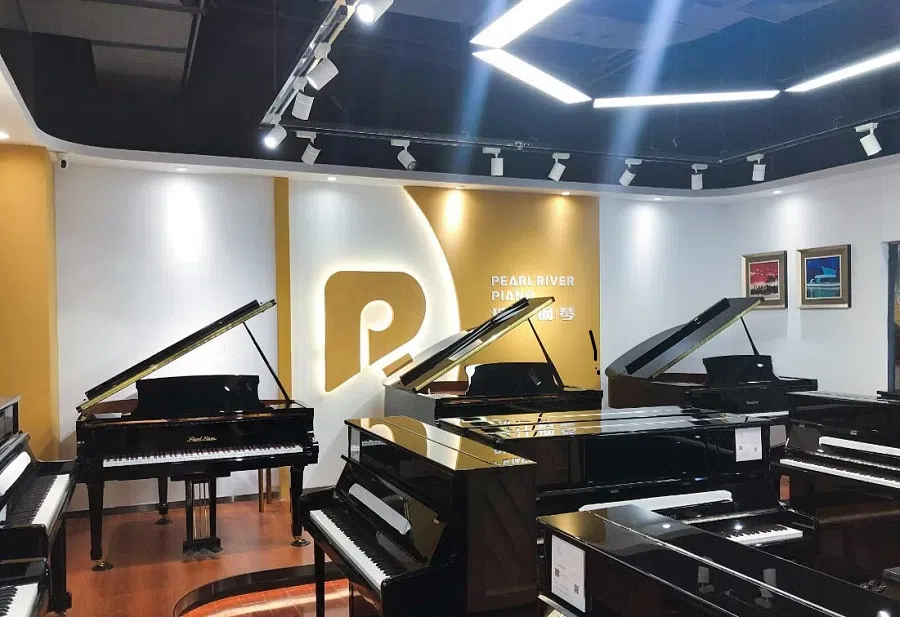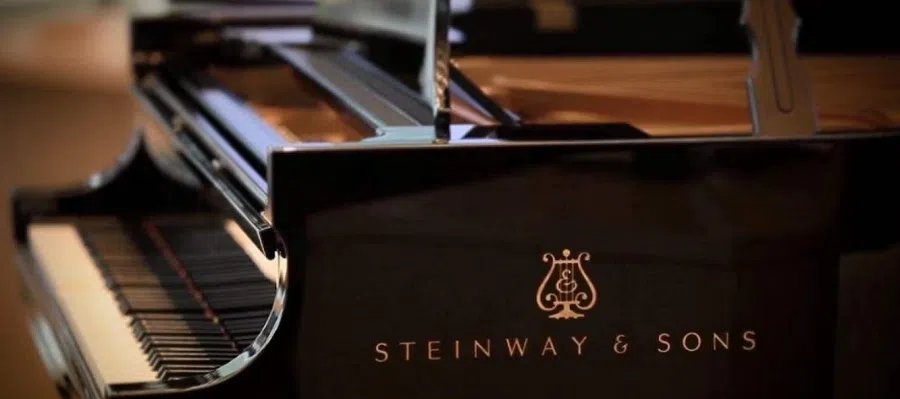China's middle-class families are giving up their pianos
The poor performance of the piano industry has revealed a dying trend of learning how to play the piano in China's middle class. No longer seen as a gateway into a higher social status, the piano has become a burden given the tough economic situation and the officials' de-emphasis on piano talent in national examinations. Lianhe Zaobao's China desk tells us more.

China's once-thriving piano industry is now in an unprecedented dilemma. The piano, once a staple in households, has become a redundant object.
Falling sales for top industry players
Since the second half of 2022, the Chinese piano industry has been shrouded in dark clouds. Weak market demand, worsening inventory pressure, declining birth rates, the "double reduction" policy (reducing the burdens of homework and after-school tutoring) and other factors have led to a decline in the development of the entire industry.
The most direct sign of this trend is the bleak performance by the only two piano companies listed on the A-shares market, namely Hailun Piano and Pearl River Piano Group.
... a piano bought previously at 50,000 RMB to 60,000 RMB will not even fetch 5,000 RMB now.
In the first three quarters of 2023, Hailun Piano's revenue fell by 21.99% year-on-year, with net profit attributable to parent company dropping sharply by 24.7%, while Pearl River Piano Group's revenue fell by 31.47% year-on-year, with net profit attributable to parent company plummeting by 93.54%. These statistics reflect an ominous sign - the piano industry is experiencing a downturn in business.
These two companies are not alone in their dire straits. According to data by China Musical Instrument Association, in the first three quarters of 2023, 232 enterprises above designated size (enterprises that generate at least 20 million RMB (US$2.82 million) in annual revenue from principal activities) in the musical instruments industry saw their operating income fall by 21.28% year-on-year, with profits down 43.35%, leaving the industry-wide profit margin at only 6.59%.
Not only is the piano industry in the doldrums, its second-hand market is also going through tough times.

On Idle Fish and other second-hand sales applications, many people are fervently trying to resell their pianos, with most showing the description along the lines of "my child has no interest in learning it anymore". The price listed is often no more than 10,000 RMB, with the lowest at a bottom-scraping price of 4,000 RMB.
Some netizens said that a piano previously bought at 50,000 RMB to 60,000 RMB will not even fetch 5,000 RMB now.
According to statistics, there were 650,000 music schools and 25,000 piano shops in China in early 2022, but around 30% had closed down by the end of 2022.
The impact of the terrible sales for manufacturers upstream has affected the music schools and piano shops downstream. In the first- and second-tier cities, piano shops of all sizes are shuttering one after another. Even the Emperoy International Music Center - once the industry standard - closed down in August 2023.
According to statistics, there were 650,000 music schools and 25,000 piano shops in China in early 2022, but around 30% had closed down by the end of 2022. The piano industry, which saw rapid growth for more than a decade, is suddenly feeling an unprecedented chill overnight.
Burden for middle-class families
One of the reasons for this situation is because middle-class families are no longer able to afford the luxury of having a piano.
For many middle-class families, a piano is a symbol of the bourgeoisie. Regardless of the high costs, there should be a piano at home or children should attend piano lessons, so as to appear upper crust.
However, as a skill to showcase taste and wealth, playing the piano still requires natural talent - effort alone does not guarantee results. Many parents of jiwa (鸡娃, literally "chicken babies"; referring to kids with lots of after-school classes) not only end up at loggerheads with their children who are unwilling to practise the piano, they also have to deal with the rising costs, without even a guarantee on a return.

Especially with the declining economy, low consumer confidence and an environment where uncertainties are increasingly apparent, the incomes of middle-class families are shrinking, with assets continually collapsing. Even for middle-class families who saw the piano as a gateway to a certain lifestyle, they most likely have no choice but to reconsider their goals.
Mr Fan, who has been in the second-hand piano business for more than 20 years, said in an interview with Cover News that the dip in piano sales is mainly impacted by the drop in the incomes of the middle class, and in the last couple of years both income and long-term prospects for the future look bleak.
Pearl River Piano Group also revealed in their 2023 mid-year financial report that consumption in the piano industry is easily affected by the consumer environment, disposable income levels and consumer confidence, and that growth of consumer market demand for the musical instruments industry would gradually slow down.
... learning how to play the piano is no longer a way for students to gain additional points for their further education, or even as a channel for special admission for the arts.
Learning piano for music or grades?
Another even more crucial reason is possibly the fact that learning how to play the piano is no longer a way for students to gain additional points for their further education, or even as a channel for special admission for the arts.
The piano craze truly took off in China around 2008, when China implemented a policy allowing art students who attained Grade 10 in piano to earn extra points for their zhongkao (Senior High School Entrance Examination). This sparked off a wave of parents all over the country signing their children up to learn piano, in turn spurring a large market for piano lessons and exams.

People even claimed that if your child was not learning how to play the piano, it would be crass to say that you were into the arts.
Statistics showed that in 2001, there were an average of 1.3 pianos for every 100 urban households; that figure rose to 5.82 in 2017 and to more than 8 in 2021, with Shanghai, Guangdong and Beijing the top three regions with the most number of pianos.
An average of 400,000 pianos were sold a year from 2017 to 2020 in China, surpassing an average of around 30,000 per year in the US over the same period. Meanwhile, about 40 million people took piano lessons in China, roughly seven times the number in the US. If all of them signed up for graded examinations, the industry would make an astronomical amount from just registration fees and lessons.
However, the growth bubble gradually burst in 2018, when Chinese officials eliminated the preferential policy that allows students to gain bonus points for their zhongkao based on their standout performances in artistic competitions, throwing a bucket of cold water on parents eager to send their children to piano lessons.
In the past, several schools had art quotas that admitted students with poorer academic results based on their artistic talent, but even this is no longer an option. In 2021, Chinese officials implemented the "double reduction" policy, which ruined the entire piano market in one fell swoop.
And it is not just pianos in stores that are without buyers - the inventory is piling up in warehouses as well.

Since then, many parents with high hopes for their children believe that piano lessons are just icing on the cake. With parents no longer eager to enrol their children in piano lessons, fewer people are learning to play the piano and music schools are shutting down, leaving pianos with no buyers.
After 2018, the sales of Hailun Piano and Pearl River Piano went downhill. The sales volume of Hailun Piano's upright pianos fell from 36,738 units in 2019 to 22,792 in 2022, while that of Pearl River Piano decreased from 156,100 to 110,200 over the same period.
Hailun Piano revealed in its 2020 earnings report that the reason why its piano sales have declined is because various schools have stayed closed or delayed reopening, and offline training institutions have ceased operations. As music classes are closely related to the sales of musical instruments, a downturn in the training market indirectly affects piano sales.
And it is not just pianos in stores that are without buyers - the inventory is piling up in warehouses as well. As of 2021, 8.65 million pianos are sitting idle. Consuming inventory amid a sluggish piano market will remain a big challenge.
... the vastly different economic and social situation now has dampened the dream of upward mobility, and impractical piano dreams no longer serve middle-class families.
Piano dreams no more?
The ups and downs of China's piano market show that the demand for pianos is dependent on the graded examination market, which is in turn largely driven by the public's expectation that the ability to play the piano will help propel them into a higher social class.
But the problem is that the vastly different economic and social situation now has dampened the dream of upward mobility, and impractical piano dreams no longer serve middle-class families. At the same time, piano industry professionals are left with no choice but to accept the harsh reality that there will not be a repeat of the rapid growth seen in the past.
However, even if the piano dreams of middle-class families are shattered, pianos, especially luxury pianos, are still well-loved by high-net-worth individuals.

Known for its world-class pianos, Steinway & Sons managed to increase its net profit in spite of the headwinds in the Chinese piano market. The company recognises the growing population of high-net-worth individuals in China and is a direct beneficiary of their growing number.
When Steinway & Sons relisted on the New York Stock Exchange in 2022, it specially thanked China's rapidly growing market in its prospectus. Its net sales in China grew from US$46 million in 2016 to US$116.5 million in 2021, a compound annual growth rate of 20.4%.
At the same time, many middle-class families who have woken up from their piano dreams are also turning their attention to the more affordable digital piano.
After the gradual decline of the market for mid-range pianos such as upright pianos and grand pianos, lower-end digital pianos are gaining popularity and occupying a larger market share over time, reaching 1.026 billion RMB in 2022, an increase of 11.28% year-on-year.
The fact that some middle-class families still want to buy a piano - despite struggling to survive the grim economic situation amid a "consumption downgrading" wave - shows that the piano is still seen as a status symbol.
To make the piano all about hobbies and music again, and not solely about taking examinations as the current situation stands, those still trapped in their piano dreams must wake up and stop treating the piano as a status symbol.
After all, anyone is capable of creating beautiful melodies on the black and white keys of a piano.
This article was first published in Lianhe Zaobao as "中国中产家庭的钢琴梦,碎了".





![[Big read] When the Arctic opens, what happens to Singapore?](https://cassette.sphdigital.com.sg/image/thinkchina/da65edebca34645c711c55e83e9877109b3c53847ebb1305573974651df1d13a)